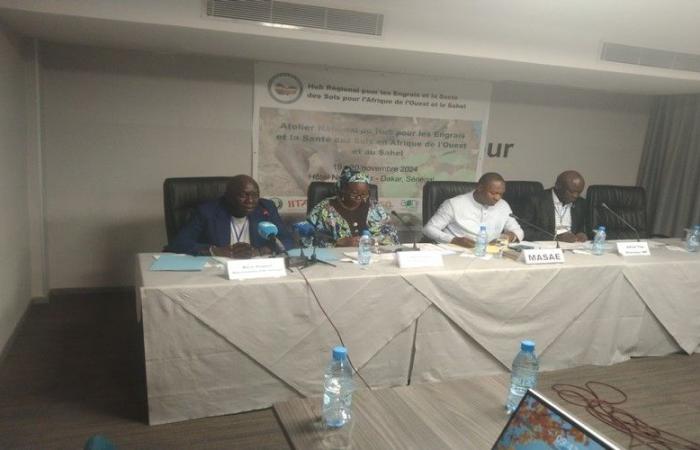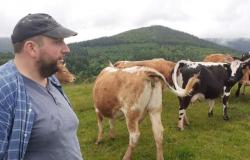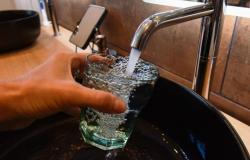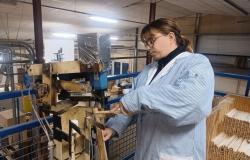
Agriculture in West Africa and the Sahel is at the heart of the region’s sustainable development challenges. Faced with increasingly degraded soils and often suboptimal fertilizer management, it becomes crucial to find sustainable solutions that ensure both better agricultural productivity and preservation of the environment. It is in this context that the National Hub Workshop for Fertilizers and Soil Health is being held, from November 19 to 20, 2024, in Dakar, the Senegalese capital. This workshop follows the technical launch of the regional hub, organized on June 27 and 28, 2024 in Ibadan, Nigeria, and marks a decisive step in the Hub implementation process. The aim is to provide concrete solutions to the challenges related to fertilizer use and soil health management, which are essential to supporting food security and sustainable economic development in Senegal and the Sahel region. .
The fertilizer and soil health hub: a crucial initiative for West Africa and the Sahel
The Fertilizer and Soil Health Hub is a regional initiative launched by the International Fertilizer Development Center (IFDC), aimed at improving soil quality and optimizing the use of fertilizers in West Africa and in the Sahel. The region is faced with often poor and poorly managed soils, which leads to a decline in land fertility, a reduction in agricultural yields and increased vulnerability to climate change, underlined Bocar Diagana representing IFDC Senegal.
According to him, the objective of the Hub is to contribute to the transformation of the agricultural sector by developing solutions adapted to local realities. This involves promoting the rational use of fertilizers, restoring soil health, and establishing sustainable mechanisms for the management of natural resources. By supporting countries in the region in implementing these solutions, the Hub seeks to improve agricultural yields, ensure food security and strengthen the resilience of agricultural systems in the face of climate and economic crises.
The National Workshop in Dakar: a platform for sharing and collaboration
For her part, the vice-president of the IFDC, Oumou Camara, estimated that the national workshop of the hub for fertilizers and soil health constitutes “an essential platform for key players in the agricultural sector and research in the Senegal.” Scheduled for November 19 and 20, 2024, this workshop brings together public and private sector experts, researchers, development actors and government officials. Participants will have the opportunity to share their experiences, discuss current challenges and work together to identify practical solutions adapted to the specificities of Senegal.
The main objectives of this workshop include identifying short-term opportunities for technical support to existing initiatives. The Hub will provide its expertise to support projects already in progress, with a view to improving fertilizer management and soil health in various contexts (subsistence agriculture, commercial agriculture, etc.).
Explore future investments in fertilizer and soil health. This will involve identifying investment needs to strengthen local capacities, promote sustainable agricultural technologies and facilitate access to quality fertilizers.
The workshop also aims to strengthen the technical capacities of local research institutes. It will also involve identifying areas where training is necessary to improve the skills of researchers, agronomists and technicians specializing in sustainable agriculture and soil management.
Current challenges and opportunities in Senegal
“Senegal, like other countries in the region, faces several major challenges in terms of soil management and fertilizer use. The increase in agricultural yields is often limited by soils that lack fertility, traditional agricultural practices that are not very diversified and difficulties in accessing fertilizers and modern technologies. In addition, climate change, marked by episodes of drought and variations in rainfall, exacerbates soil degradation and the vulnerability of agricultural producers,” regretted the legal advisor to the Minister of Agriculture, Food Sovereignty and Livestock, Me El Hadji Mamadou Ass Thiam.
However, he says, these challenges also bring opportunities. “Senegal has a dynamic agricultural sector, with promising initiatives in agronomic research, crop diversification and the adoption of more sustainable agricultural practices. The Dakar workshop will therefore be an opportunity to capitalize on these opportunities by mobilizing stakeholders in the sector, highlighting possible synergies and strengthening cooperation between the different stakeholders (government, private sector, international organizations, and research organizations). civil society),” he noted.
Key themes covered during the workshop
The workshop addresses several crucial themes for sustainable agricultural development in Senegal and the region. Among the main issues on the agenda is the analysis of soil health challenges in Senegal. Indeed, Senegalese soils are facing many problems, including the degradation of fertility, increasing acidity, and erosion. This diagnosis will make it possible to develop recommendations adapted to each type of soil and crop.
Sustainable management of fertilizers. At this level, better use of fertilizers, particularly through the promotion of organic and organic fertilizers, will make it possible to improve soil productivity without harming their long-term health.
New technologies for soil management. Here, the adoption of modern technologies, such as precision agriculture, soil mapping and the use of drones, can offer new perspectives for monitoring soil conditions and optimizing fertilizer use.
Finally, the role of public policies and investments in sustainable agriculture. Discussions on public policies that can support the transition to sustainable agriculture, including subsidies for ecological fertilizers, research on drought-resistant varieties and optimization of the use of natural resources.
A future strategy for agriculture in Senegal
The national hub workshop for fertilizers and soil health represents a unique opportunity for Senegal to strengthen its approach to soil and fertilizer management by drawing on best practices and available expertise. The event will also pave the way for new partnerships and strategic investments in sustainable agriculture, to ensure food security, improve yields and increase resilience to climate challenges.
This participatory and multi-actor workshop will lay the foundations for a more sustainable and inclusive agriculture in Senegal, thus contributing to the transformation of the agricultural sector at the national, but also regional, level. By combining research, development and agricultural policy, Senegal will be able to meet current challenges and seize the opportunities offered by sustainable soil and fertilizer management to improve the lives of its farmers and guarantee a prosperous agricultural future.
Moctar FICUU / VivAfrik





